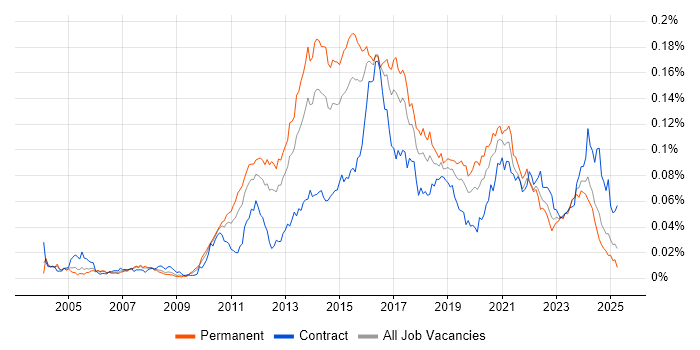Kernel-Based Virtual Machine (KVM)
UK
The table below provides summary statistics for permanent job vacancies requiring KVM skills. It includes a benchmarking guide to the annual salaries offered in vacancies that cited KVM over the 6 months leading up to 18 May 2025, comparing them to the same period in the previous two years.
| 6 months to 18 May 2025 |
Same period 2024 | Same period 2023 | |
|---|---|---|---|
| Rank | 716 | 794 | 914 |
| Rank change year-on-year | +78 | +120 | +186 |
| Permanent jobs citing KVM | 13 | 89 | 47 |
| As % of all permanent jobs advertised in the UK | 0.023% | 0.089% | 0.047% |
| As % of the System Software category | 0.21% | 0.74% | 0.31% |
| Number of salaries quoted | 9 | 80 | 38 |
| 10th Percentile | £46,250 | - | £44,250 |
| 25th Percentile | £47,500 | £24,240 | £50,000 |
| Median annual salary (50th Percentile) | £55,000 | £26,000 | £60,000 |
| Median % change year-on-year | +111.54% | -56.67% | -14.29% |
| 75th Percentile | £75,000 | £51,000 | £76,250 |
| 90th Percentile | £85,000 | £74,125 | £81,250 |
| UK excluding London median annual salary | £50,000 | £24,811 | £60,000 |
| % change year-on-year | +101.52% | -58.65% | -7.69% |
All System Software Skills
UK
KVM falls under the System Software category. For comparison with the information above, the following table provides summary statistics for all permanent job vacancies requiring system software skills.
| Permanent vacancies with a requirement for system software skills | 6,294 | 11,967 | 15,379 |
| As % of all permanent jobs advertised in the UK | 11.24% | 11.99% | 15.50% |
| Number of salaries quoted | 3,815 | 9,464 | 10,090 |
| 10th Percentile | £28,000 | £26,250 | £28,000 |
| 25th Percentile | £36,250 | £32,500 | £37,500 |
| Median annual salary (50th Percentile) | £55,000 | £50,000 | £55,000 |
| Median % change year-on-year | +10.00% | -9.09% | - |
| 75th Percentile | £77,500 | £67,500 | £77,500 |
| 90th Percentile | £98,474 | £85,000 | £95,000 |
| UK excluding London median annual salary | £47,500 | £45,000 | £47,500 |
| % change year-on-year | +5.56% | -5.26% | -5.00% |
KVM
Job Vacancy Trend
Job postings citing KVM as a proportion of all IT jobs advertised.

KVM
Salary Trend
3-month moving average salary quoted in jobs citing KVM.
KVM
Salary Histogram
Salary distribution for jobs citing KVM over the 6 months to 18 May 2025.
KVM
Top 9 Job Locations
The table below looks at the demand and provides a guide to the median salaries quoted in IT jobs citing KVM within the UK over the 6 months to 18 May 2025. The 'Rank Change' column provides an indication of the change in demand within each location based on the same 6 month period last year.
| Location | Rank Change on Same Period Last Year |
Matching Permanent IT Job Ads |
Median Salary Past 6 Months |
Median Salary % Change on Same Period Last Year |
Live Jobs |
|---|---|---|---|---|---|
| England | +65 | 11 | £62,205 | +139.25% | 27 |
| UK excluding London | +112 | 8 | £50,000 | +101.52% | 16 |
| Work from Home | +124 | 7 | £62,500 | +16.28% | 14 |
| London | +103 | 5 | £72,500 | -4.92% | 17 |
| North of England | +42 | 5 | £58,603 | +136.20% | 3 |
| North West | -5 | 3 | £58,603 | +136.20% | 3 |
| Scotland | +101 | 2 | £50,000 | +101.52% | 2 |
| Yorkshire | +67 | 2 | - | - | |
| South East | +74 | 1 | £42,500 | +63.46% | 4 |
KVM
Co-occurring Skills and Capabilities by Category
The follow tables expand on the table above by listing co-occurrences grouped by category. The same employment type, locality and period is covered with up to 20 co-occurrences shown in each of the following categories:
|
|
|||||||||||||||||||||||||||||||||||||||||||||||||||||||||||||||||||||||||||||||||||||||||||||
|
|
|||||||||||||||||||||||||||||||||||||||||||||||||||||||||||||||||||||||||||||||||||||||||||||
|
|
|||||||||||||||||||||||||||||||||||||||||||||||||||||||||||||||||||||||||||||||||||||||||||||
|
|
|||||||||||||||||||||||||||||||||||||||||||||||||||||||||||||||||||||||||||||||||||||||||||||
|
|
|||||||||||||||||||||||||||||||||||||||||||||||||||||||||||||||||||||||||||||||||||||||||||||
|
|
|||||||||||||||||||||||||||||||||||||||||||||||||||||||||||||||||||||||||||||||||||||||||||||
|
|
|||||||||||||||||||||||||||||||||||||||||||||||||||||||||||||||||||||||||||||||||||||||||||||
|
|
|||||||||||||||||||||||||||||||||||||||||||||||||||||||||||||||||||||||||||||||||||||||||||||
|
||||||||||||||||||||||||||||||||||||||||||||||||||||||||||||||||||||||||||||||||||||||||||||||
